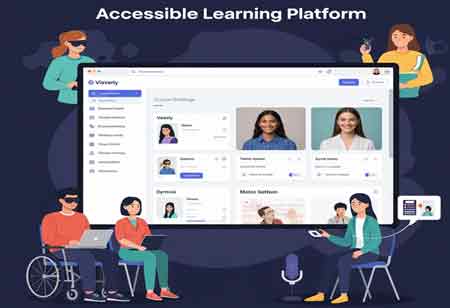THANK YOU FOR SUBSCRIBING
Be first to read the latest tech news, Industry Leader's Insights, and CIO interviews of medium and large enterprises exclusively from Education Technology Insights
Empowering Educators and Earning Trust: The Real Path to AI-Enhanced Learning
AI integration in education offers personalized learning and efficiency, but raises concerns about privacy and bias. Trust must be built through transparency, ethical use, and community engagement.

By
Education Technology Insights | Thursday, September 04, 2025
Stay ahead of the industry with exclusive feature stories on the top companies, expert insights and the latest news delivered straight to your inbox. Subscribe today.
Fremont, CA: The integration of Artificial Intelligence (AI) into education promises a revolutionary shift, offering personalized learning, automated feedback, and administrative efficiencies that can transform the classroom experience. However, alongside this immense potential, there's a natural apprehension among parents, students, and even educators. Concerns about data privacy, algorithmic bias, over-reliance on technology, and the potential impact on human interaction often fuel skepticism. For AI-powered learning tools to truly flourish, schools must proactively build and maintain trust within their communities.
Transparency and Ethical Implementation: Building Trust in AI-Driven Education
Institutions must clearly define the purpose and scope of AI deployment, articulating the specific educational challenges being addressed and the intended learning outcomes. This helps stakeholders—particularly parents, students, and teachers—understand the value beyond technological novelty. Demystifying AI is essential; schools should provide simple, accessible explanations of how these tools function, the data they rely on, and how they generate recommendations or decisions. Using relatable analogies, such as comparing adaptive learning AI to a tutor who tailors lessons to a student’s progress, can help bridge the understanding gap. Transparency also requires acknowledging limitations—AI tools are not infallible and cannot replicate the nuances of human interactions or emotional intelligence. Schools must be upfront about potential biases, errors, and the scope of AI's capabilities to manage expectations realistically.
Equally important is communicating data practices with clarity and transparency. Schools should detail what student data is collected, how it is stored, who has access, and how it will be used, prioritizing privacy and adhering to relevant regulations like FERPA. Ethical deployment hinges on the thorough vetting of AI tools to ensure fairness and inclusivity. Tools should be scrutinized for algorithmic bias and tested across diverse student populations. Institutions must actively monitor AI systems post-implementation and be prepared to recalibrate or replace them if they perpetuate inequity. Human oversight must remain central; educators should retain agency and decision-making authority, using AI to augment—not replace—their professional expertise.
AI tools must be accessible to all students, including those with disabilities or different learning needs, to ensure equitable learning outcomes. Data collection should adhere to a “minimum necessary” principle, emphasizing consent and the protection of sensitive information.
Empowering Educators to Foster Trust in AI Systems
Comprehensive, ongoing professional development is essential to help teachers understand both the capabilities and limitations of AI tools. Training should address both technical use and pedagogical integration, as well as ethical considerations. Providing low-risk environments for hands-on experimentation can build familiarity and confidence. Facilitating peer collaboration and knowledge sharing among educators can further accelerate the adoption and sharing of best practices. Highlighting how AI can alleviate administrative burdens—such as automating grading or supporting personalized lesson planning—can also demonstrate tangible benefits that enhance rather than disrupt teaching.
Engaging parents and students is equally vital. Schools should host dedicated workshops and information sessions to educate parents, address their concerns, and explain how AI aligns with the institution’s educational mission. Open dialogue platforms—such as town halls, online forums, or designated feedback channels—enable stakeholders to express their opinions and stay informed. For students, cultivating AI literacy is key. They should be taught how AI works, its ethical implications, and how to evaluate AI-generated content critically. Promoting responsible use—encouraging students to utilize AI to support, rather than replace, their critical thinking—reinforces academic integrity. Involving students in policy development where appropriate can foster ownership and ensure policies reflect their lived experiences and perspectives.
AI-powered learning tools hold immense promise for overhauling education, but their successful integration hinges on building a strong foundation of trust. Schools can create a positive AI environment by ensuring transparency, ethical use, educator support, stakeholder involvement, and ongoing assessment, enhancing learning and collaboration between humans and AI.







